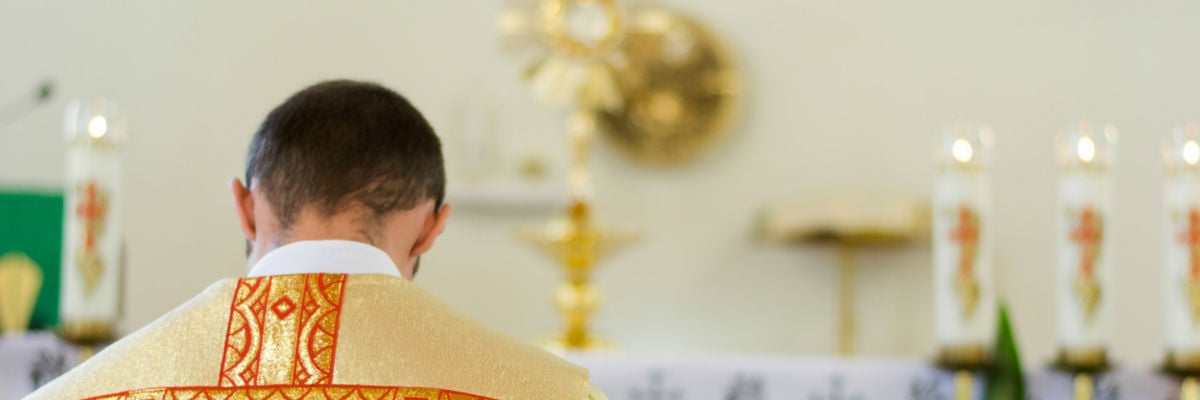
In disputes between Protestants and Catholics, what is presented as an opposition of either/or is often resolved by an inclusive both/and. When Scripture is pitted against Tradition, we say that they are two modes of one revelation. When we are told we must choose between grace and works, we affirm “faith works through love.” Another area in which this holds true is in the claim that the ordained ministry interferes with both the sole mediatorship of Christ and the common priesthood of all believers.
Dr. J.V. Fesko, a minister in the Orthodox Presbyterian Church and professor at Reformed Theological Seminary in Jackson, Mississippi, lays out the classic Protestant position in a piece for the Gospel Coalition website: “The doctrine of the priesthood of all believers states that all believers in Christ share in his priestly status; therefore, there is no special class of people who mediate the knowledge, presence, and forgiveness of Christ to the rest of believers, and all believers have the right and authority to read, interpret, and apply the teachings of Scripture.”
(It is curious that he sets the “Protestant belief” against that of the “medieval Christians,” as though there were not still nearly 2 billion Catholic and Orthodox Christians today whose churches teach essentially what the medievals held.)
Professor Fesko ably lays out the scriptural warrant for the idea of Christian participation in Christ’s priesthood, most notably 1 Peter 2:9: “You are a chosen race, a royal priesthood, a holy nation, a people for his own possession, that you may proclaim the excellencies of him who called you out of darkness into his marvelous light.” From these texts he argues that “there is no hierarchy of beings (archangels, angels, archbishops, bishops, and priests) standing between the believer and God. Rather, we have union, communion, and fellowship with God through our great high priest, Jesus Christ.”
Yet completely absent from his article is any mention of the apostolic ministry. In his section on “scriptural teaching,” he makes twenty-two references to the Bible, but none regarding the apostles or the offices of bishop, presbyter, and deacon. If Christ had not intended to institute a ministry with real spiritual authority or efficacy, why would he give to Peter the keys to the kingdom of heaven (Matthew 16:19)? Why would he empower the apostles to “bind and loose” (Matthew 18:18), or to forgive and retain sins (John 20;23)? Why would St. Paul describe to Timothy and Titus in great detail the qualifications for bishops, presbyters, and deacons? Why would St. James instruct believers to call for the presbyters of the Church to anoint the sick? Why would the letters of St. Ignatius of Antioch, some of the earliest Christian documents we have, speak so clearly of the threefold ministry and the importance of obedience to the bishop?
Certainly, Professor Fesko does not deny the need for ministry within the Christian community. He writes that the universal priesthood “does not mean that we should do away with pastoral or ministerial authorities. While those authorities are a part of the way that God blesses his church with instruction in sound doctrine, those with churchly authority need the rest of the body just as much.”
A Catholic would not dispute this last point. The Catechism of the Catholic Church says that “the ministerial priesthood is at the service of the common priesthood” (1547). This passage does not merely affirm Fesko’s valid point, it also points to the main weakness in his position.
In short, Fesko poses a false dichotomy. “Medieval Christians,” just like Catholics of any era, never taught that the ordained priests alone had a participation in the priestly office of Christ. Rather, the Church has always taught that there are different modes of participation in “the priesthood of Jesus Christ.”
It may help to lay out the points of agreement. Catholics believe that Christ is the “unique mediator” and in the common priesthood, as Christ
has made of the Church ‘a kingdom, priests for his God and Father.’ The whole community of believers is, as such, priestly. The faithful exercise their baptismal priesthood through their participation, each according to his own vocation, in Christ’s mission as priest, prophet, and king (CCC 1546, internal quote Rev. 1:6).
Where we differ, then, is on the role of the priest within the New Dispensation. For Fesko, Christian ministers are teachers and governors, but are in no way “mediators” on the Church’s behalf. For him, the ordained priest is an obstacle between Christ and the believer, an unnecessary middle-man.
Yet, this betrays another false dichotomy. The ministry of the ordained priest is not in conflict or competition with the sole mediatorship of Christ, because the priest does not claim anything of his own apart from Christ. He is Christ’s priest. The priest “depends entirely on Christ and on his unique priesthood” (CCC 1551). He acts in persona Christi. The priest does not stand in Jesus’ way, but acts as His instrument. The Church teaches that “In the ecclesial service of the ordained minister, it is Christ himself who is present to his Church as Head of his Body, Shepherd of his flock, high priest of the redemptive sacrifice, Teacher of Truth.” (CCC 1548)
It is a ministry of participation, which the Protestant has already acknowledged in the idea of the common priesthood but for some reason is unwilling to apply to the ministerial priesthood.
What is presented as an opposition, then, is really no opposition at all. When we are told that the ordained priesthood usurps the common priesthood, Catholics can respond that “The ministerial or hierarchical priesthood of bishops and priests, and the common priesthood of all the faithful participate, ‘each in its own proper way, in the one priesthood of Christ.’” (CCC 1547) The two do not compete, like voices trying to speak over each other, but cohere, like voices singing in harmony.



